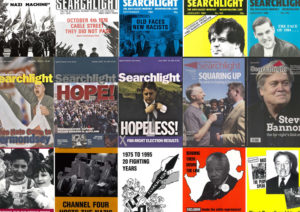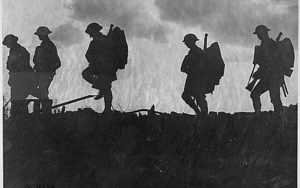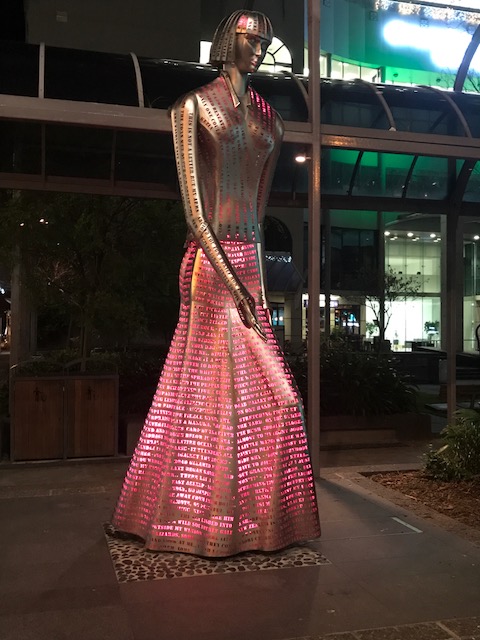Citizenship and Heritage
- Home
- Research
- Research Impact Showcase
- Citizenship and Heritage
Read about our Citizenship and Heritage Research Impact Case Studies below.
-
REF Impact Case Study 2021
- Submitted to: 32 – Art and Design: History, Practice and Theory
- Submitted title: New methods for participatory art with audiences of publicly funded arts organisations.

Summary
Associate Professor Andy Hewitt’s research has developed new methods of audience engagement with art organisations. By producing art projects that were placed directly into the public realm (not behind the doors of galleries), this research aimed to give new and different audiences the opportunity to view and engage with art. Projects like Citizen Ship (2017) were placed in ‘social kiosks’ and passers-by engaged in slogan writing workshops focussed on ideas around shopping, gender, current affairs, and citizenship. The slogan texts were collected and made into vinyl-signs and pasted onto the Citizen Ship kiosk throughout the duration of the project. This allowed for an exchange of diverse opinions through a publishing process and created new modes of sharing opinion amongst members of the public.
Hewitt’s research investigates the role that art projects play in the production of new values and public opinion, examining how art can support and advocate new empathies within urban and civic communities. He argues for arts institutions and galleries as key spaces for civic participation, and for the use of participatory art practices (as above) to encourage active citizenship and increase community cohesion. By designing collaborative projects that include methods of publishing, opinions and values can be shared, reconsidered, and repositioned.
Researchers
-
REF Impact Case Study 2021
- Submitted to: 17 – Business and Management Studies
- Submitted title: Driving evidence-based change in ‘Citizens in Policing’ strategy, leadership and innovation.

Summary
The Institute for Public Safety, Crime and Justice (IPSCJ) has undertaken the largest research programme into police volunteering programmes to support the development of the ‘Citizens in Policing’ national portfolio. Working closely with the National Police Chiefs’ Council, the Home Office, the College of Policing, and individual police forces across the country, this programme of applied research has shaped national strategy for over 38,000 volunteers in Special Constabularies, Police Support Volunteers, Volunteer Police Cadets and the Mini Police.
This research included the first national-scale surveys of Special Constables and of Police Support Volunteers. These surveys provided a deeper insight into volunteer motivations and experience, created new understandings of volunteer career lifecycles and pathways, provided new data identifying challenges of diversity and inclusion, and advanced thinking on police volunteer support and leadership. This research presents the first national insight into Special Constable experience and perspectives on representation and wellbeing. IPSCJ’s national profile, led by Associate Professor Matt Callender, has generated international interest and collaboration with colleagues in the United States, Japan, and Malaysia.
Researchers
- Associate Professor Matthew Callender
- Dr Iain Britton
- Dr Laura Knight
- Kathryn Cahalin
-
REF Impact Case Study 2021
- Submitted to: 28 – History
- Submitted title: The Searchlight Archive and British Extreme Right Culture

Summary
Professor Paul Jackson’s research on British Extreme Right Culture has supported local authorities, the Home Office (2019), anti-fascist and anti-racist campaign groups in providing guidance and professional development in understanding and tackling extreme right activism. This includes an on-going analysis of developing events for Jane’s Terrorism and Insurgency Centre.
Based on historically informed research using the Searchlight Archive at UON and recent online material generated by contemporary activists, Professor Jackson’s research has given police and front-line workers tools to help combat extreme right activism, provided policymakers with an evidence base to challenge the extreme right and provided media outlets with information to report on issues such as neo-Nazi terrorism in greater depth.
Researchers
-
REF Impact Case Study 2021
- Submitted to: 28 – History
- Submitted title: Highlighting British military intelligence within the First World War centenaries

Summary
Dr Jim Beach’s research on British military intelligence during the First World War has engaged members of the public with the conflict’s centenary, supported heritage organisations curating intelligence-related content, been used to develop content for dramas and documentaries on First World War projects with the BBC and helped GCHQ in marking its own centenary. Dr Beach’s regular presentations for the Western Front Association WFA talk online, alongside his role as an historical advisor to the Military Intelligence Museum and Bletchley Park and his support for three BBC drama series – Crimson Field 2014, Homefront 2016 and Tommies (2014-2018) – has highlighted. the importance of First World War military intelligence to the public. His work has also shaped the ways in which a major national intelligence agency engaged with its own centenary.
This research, underpinned by archival work in Australia, Belgium, Britain, Canada, France, New Zealand, and the United States, has led to ground-breaking insights into how intelligence about the enemy affected British military decision making. Dr Beach’s book Haig’s Intelligence provides a much-needed explanation of the intelligence dimension within Britain’s war on the western front. This has been followed by publications on British Tank Corps intelligence and British Intelligence and the Battle of Verdun.
Researchers
-
REF Impact Case Study 2021
- Submitted to: 27 – English Language and Literature
- Submitted title: Increasing the Public Heritage of Katherine Mansfield in France and New Zealand.

The new statue of Mansfield in Wellington which the KMS was instrumental in initiating. Due to local recognition of Mansfield’s importance as a woman writer in particular, it is used as a site for publicising breast cancer and is lit up in pink on the annual day of awareness of breast cancer on the part of this charity.
Summary
Research undertaken by Professor Janet Wilson and Dr Gerri Kimber has led to a re-evaluation of the importance of Katherine Mansfield’s writings and her cultural legacy in modernist literature. The significance of Katherine Mansfield’s work has been established through heritage events, the commissioning of public art and through engagement with a wide range of educational providers in Europe and New Zealand.
Professor Janet Wilson and Dr Gerri Kimber co-founded the Katherine Mansfield Society which seeks to celebrate her cultural legacy in locations which inspired her writing and those where she lived. Their approaches, based on theories of gender and postcolonialism, have reshaped and added nuance to Mansfield’s reputation as a colonial modernist. By highlighting the importance of where Mansfield lived and wrote, this research has reinforced the continued relevance of her writing to the present day, both in Europe and New Zealand.
Researchers
- Professor Janet Wilson
- Dr Gerri Kimber